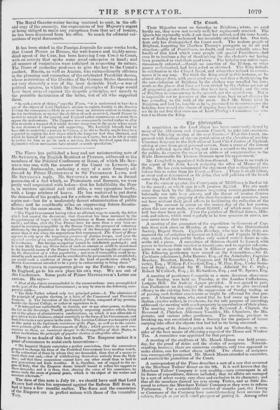Ebe Court.
Their Majesties went on Saturday to Brighton ; where, We need hardly say, they were not merely well, but rapturously received. The Queen has repeatedly walked out since her arrival, and the same hearti- ness of feeling that welcomed has invariably attended her. One inci- dent only has distinguished the Court week. The zealous people of Brighton, forgetting SirMatthew Tierney's panegyric on its air and situation—gifts of Providence, no doubt, and most valuable ones, but hardly of that kind which some people call special Providence—had seen fit to institute a day of thanksgiving for the cholera's not having been permitted to visit their good town. The holyday was rather sanc- timoniously enforced,—though no sanction of the Bishop, or other power ecclesiastical, had been asked or obtained. The King forbade its celebration in the Chapel Royal, and altogether refused to counte- nance it in any way. We think the King acted in this instance, as he almost always does, with greet good sense; and that a thanksgiving for the non-visitation of Brighton by the cholera was uncalled for, inas- much as the places that have net been visited by the cholera are out of all proportion greater than those that have been visited ; and the ca.4e of Brighton in consequence is the general, not the special one. But it is impossible not to perceive at the same time, how an act changes its hue according to the rank of the actor. Had Mr. Hume lived in Brighton, and had he, humble as he is, presumod to discountenance the holyday, how would the charge of impiety have been aggravated ! Yet we do do not find that even one of Lord Henley's Committee has ven-
tured to blame the King. •


























 Previous page
Previous page